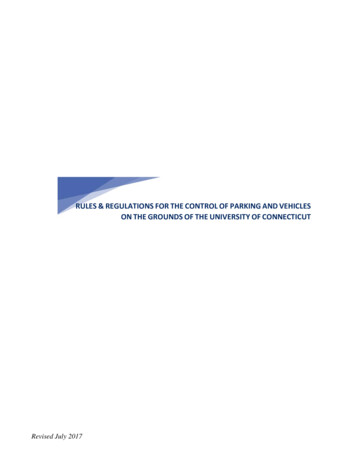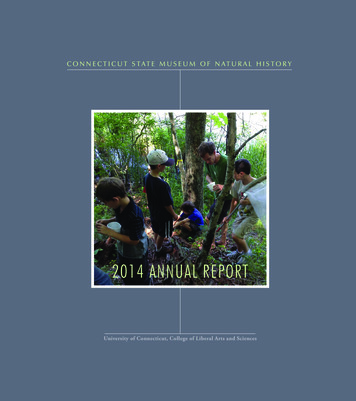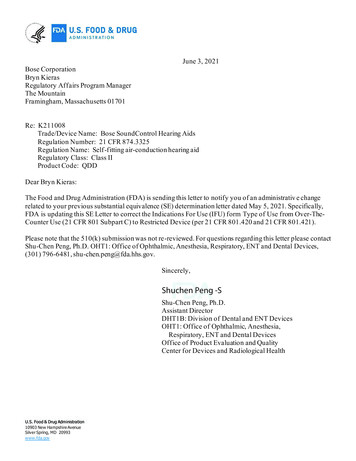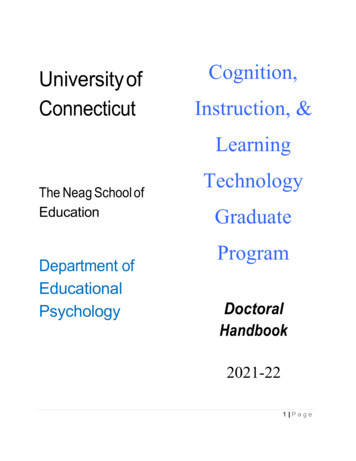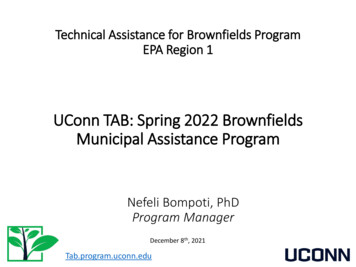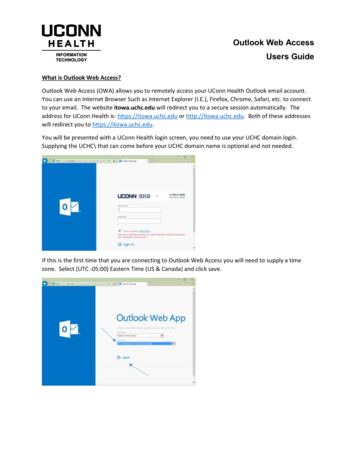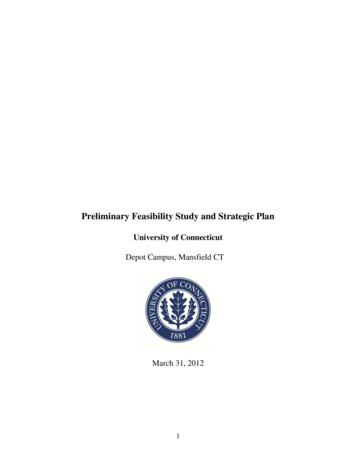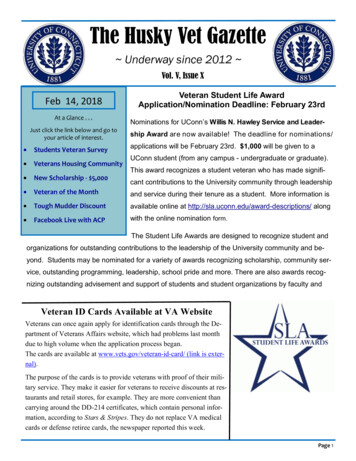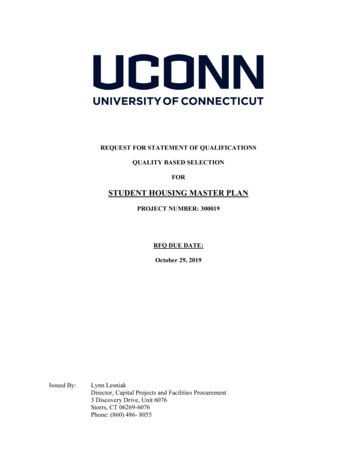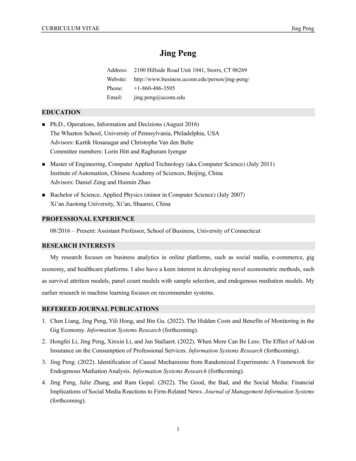
Transcription
CURRICULUM VITAEJing PengJing PengAddress:2100 Hillside Road Unit 1041, Storrs, CT jing-peng/Phone: 1-860-486-3505Email:jing.peng@uconn.eduEDUCATION Ph.D., Operations, Information and Decisions (August 2016)The Wharton School, University of Pennsylvania, Philadelphia, USAAdvisors: Kartik Hosanagar and Christophe Van den BulteCommittee members: Lorin Hitt and Raghuram Iyengar Master of Engineering, Computer Applied Technology (aka Computer Science) (July 2011)Institute of Automation, Chinese Academy of Sciences, Beijing, ChinaAdvisors: Daniel Zeng and Huimin Zhao Bachelor of Science, Applied Physics (minor in Computer Science) (July 2007)Xi’an Jiaotong University, Xi’an, Shaanxi, ChinaPROFESSIONAL EXPERIENCE08/2016 – Present: Assistant Professor, School of Business, University of ConnecticutRESEARCH INTERESTSMy research focuses on business analytics in online platforms, such as social media, e-commerce, gigeconomy, and healthcare platforms. I also have a keen interest in developing novel econometric methods, suchas survival attrition models, panel count models with sample selection, and endogenous mediation models. Myearlier research in machine learning focuses on recommender systems.REFEREED JOURNAL PUBLICATIONS1. Chen Liang, Jing Peng, Yili Hong, and Bin Gu. (2022). The Hidden Costs and Benefits of Monitoring in theGig Economy. Information Systems Research (forthcoming).2. Hongfei Li, Jing Peng, Xinxin Li, and Jan Stallaert. (2022). When More Can Be Less: The Effect of Add-onInsurance on the Consumption of Professional Services. Information Systems Research (forthcoming).3. Jing Peng. (2022). Identification of Causal Mechanisms from Randomized Experiments: A Framework forEndogenous Mediation Analysis. Information Systems Research (forthcoming).4. Jing Peng, Julie Zhang, and Ram Gopal. (2022). The Good, the Bad, and the Social Media: FinancialImplications of Social Media Reactions to Firm-Related News. Journal of Management Information Systems(forthcoming).1
CURRICULUM VITAEJing Peng5. Yili Hong, Jing Peng, Gordon Burtch, and Ni Huang. (2021). Just DM Me (Politely): Direct Messaging,Politeness, and Hiring Outcomes in Online Labor Markets. Information Systems Research, 32(3): 675-1097.6. Shu He, Jing Peng, Jianbin Li, and Liping Xu. (2020). Impact of Platform Owner’s Entry on Third-PartyStores. Information Systems Research, 31(4): 1467-1484.7. Jing Peng, Ashish Agarwal, Kartik Hosanagar, and Raghuram Iyengar. (2018). Network Overlap and ContentSharing on Social Media Platforms. Journal of Marketing Research, 55(4): 571-585.8. Zhu Zhang, Daniel Zeng, Ahmed Abbasi, Jing Peng, and Xiaolong Zheng. (2013). A Random Walk Modelfor Item Recommendation in Social Tagging Systems. ACM Transactions on Management InformationSystems, 4(2): 1-24.9. Jing Peng, Daniel Zeng, and Zan Huang. (2011). Latent Subject-centered Modeling of Collaborative Tagging:An Application in Social Search. ACM Transactions on Management Information Systems, 2(3): 1-23.WORKING PAPERS1. Jing Peng and Chen Liang. On the Differences Between View-Based and Purchase-Based RecommenderSystems. Conditionally Accepted at MIS Quarterly.2. Jing Peng and Christophe Van den Bulte. Participation vs. Effectiveness in Sponsored Tweet Campaigns: AQuality-Quantity Conundrum. Minor Revision at Management Science.3. Hongfei Li, Jing Peng, Gang Wang, and Xue Bai. The Impact of Process- Versus Outcome-Oriented Reviewson the Sales of Healthcare Services. Under Revision for 3rd Round Review at Information Systems Research.4. Huiyan Chen, Jing Peng, Hongfei Li, and Ramesh Shankar. Impact of Refund Policy on Sales of PaidInformation Services: The Moderating Role of Product Characteristics. Under Review at Information SystemsResearch.5. Jing Peng and Raghuram Iyengar. Attribution Based on Characteristics of Sources: A Comparison of RuleBased and Data-Driven Models. Reject and Resubmit at Journal of Marketing Research.6. Chen Liang, Yili Hong, Bin Gu, and Jing Peng. Gender Wage Gap in Online Gig Economy and GenderDifferences in Job Preferences. NET Institute Working Paper #18-03.WORK IN PROGRESS1. Jacky Chau and Jing Peng. Social Media and Intangible Asset Valuation: Evidence from Mergers andAcquisitions.2. Tong Shen, Chen Liang, Jing Peng, Mengcheng Guan, and Jianbin Li. AI Assistant in Online Pharmacy.3. Huiyan Chen, Jing Peng, Mengcheng Guan, and Jianbin Li. Social Group Buying as a Marketing Strategy.CONFERENCE PAPERS AND PRESENTATIONS1. Huiyan Chen, Hongfei Li, Jing Peng, and Ramesh Shankar. How does Enabling Product Returns Affect the Salesof Paid Knowledge-sharing Services? 2021 Workshop on Information Systems and Economics (WISE 2021),Austin, USA.2
CURRICULUM VITAEJing Peng2. David Bergman, Sule Nur Kutlu, Raymond A. Patterson, and Jing Peng. Exploit or Explore? How Users React toDifferent Types of Recommendations. The 31st Workshop on Information Technologies and Systems (WITS 2021),Austin, USA.3. Chen Liang, Jing Peng, YiliHong, and Bin Gu. Monitoring Policies and Gig Workers’ Job Preferences. 2021INFROMS Annual Meeting (INFORMS 2021), Anaheim, USA. (INFORMS eBusiness Best Paper Runner-Up)4. Jing Peng and Chen Liang. View-Also-View or Purchase-Also-Purchase: Which Is Better? 2021 Conference onInformation Systems and Technology (CIST 2021), Newport Beach, USA.5. Huiyan Chen, Hongfei Li, Jing Peng, and Ramesh Shankar. How does Enabling Product Returns Affect the Salesof Paid Knowledge-sharing Services? 2021 Conference on Information Systems and Technology (CIST 2021),Newport Beach, USA.6. Huiyan Chen, Hongfei Li, Jing Peng, and Ramesh Shankar. How does Enabling Product Returns Affect the Salesof Paid Knowledge-sharing Services? The 17th Symposium on Statistical Challenges in Electronic CommerceResearch (SCECR 2021), Online.7. Jing Peng, Julie Zhang, and Ram Gopal. To Ride or to Hide: The Impact of Social Media Reactions to News onFirm Performance. The 29th Workshop on Information Technologies and Systems (WITS 2019), Munich, Germany.8. Chen Liang, Jing Peng, YiliHong, and Bin Gu. Economic Cost of Monitoring. 2019 Conference on DigitalExperimentation (CODE 2019), Cambridge, USA.9. Jing Peng. Identification of Causal Mechanisms from Randomized Experiments. 2019 Conference on InformationSystems and Technology (CIST 2019), Seattle, USA.10. Chen Liang, Jing Peng, YiliHong, and Bin Gu. Economic Cost of Monitoring. 2019 Conference on InformationSystems and Technology (CIST 2019), Seattle, USA. (Best Paper Nominee)11. Shu He, Jing Peng, Liping Xu, Jianbin Li, and James B. Dai. Impact of Platform Owner’s Entry on Third-PartyStores. 2019 Conference on Information Systems and Technology (CIST 2019), Seattle, USA.12. Fangda Han, Hongfei Li, Shun-Yang Lee, and Jing Peng. What Can Images Tell Us: A Predication Study based onFacial Analysis. 2019 INFROMS Annual Meeting (INFORMS 2019), Seattle, USA.13. Hongfei Li, Jing Peng, Gang Wang, and Xue Bai. Disentangling the Effect of Longitudinal Consumer Reviews onProfessional Service. 2019 INFROMS Annual Meeting (INFORMS 2019), Seattle, USA.14. Guneet Kaur, Xinxin Li, and Jing Peng. Does Illusionary Progress Make You Exercise More? 2019 INFROMSAnnual Meeting (INFORMS 2019), Seattle, USA.15. Chen Liang, YiliHong, Bin Gu, and Jing Peng. Avoidance of Monitoring and Gender Wage Gap. The 15thSymposium on Statistical Challenges in Electronic Commerce Research (SCECR 2019), Hong Kong.16. Hongfei Li, Jing Peng, Gang Wang, and Xue Bai. Online Diaries and Risk Products. The 15th Symposium onStatistical Challenges in Electronic Commerce Research (SCECR 2019), Hong Kong.17. Hongfei Li, Jing Peng, Xinxin Li, and Jan Stallaert. The Impact of Ex post Risk-Reduction Mechanism on OnlineSales: Evidence from Complications Insurance for Cosmetic Surgeries. The 15th Symposium on StatisticalChallenges in Electronic Commerce Research (SCECR 2019), Hong Kong.18. Chen Liang, YiliHong, Bin Gu, and Jing Peng. Gender Differences in Job Preferences. 2018 Workshop onInformation Systems and Economics (WISE 2018), San Francisco, USA. (Best Paper Award)3
CURRICULUM VITAEJing Peng19. Yili Hong, Jing Peng, Gordon Burtch, and Ni Huang. Pipes versus Prisms: Direct Messaging System and HiringOutcomes in Online Labor Markets. 2018 Workshop on Information Systems and Economics (WISE 2018), SanFrancisco, USA.20. Chen Liang, YiliHong, Bin Gu, and Jing Peng. Gender Wage Gap in Online Gig Economy and Gender Differencesin Job Preferences. 2018 International Conference on Information Systems (ICIS 2018), San Francisco, USA.21. Yili Hong, Jing Peng, Gordon Burtch, and Ni Huang. Do You Have Time for a Quick Chat? Direct MessagingSystem Usage and Hiring Outcomes in Online Labor Markets. 2018 Conference on Information Systems andTechnology (CIST 2018), Phoenix, USA.22. Hongfei Li, Jing Peng, Gang Wang, and Xue Bai. Online Diaries and Risk Products. 2018 Conference onInformation Systems and Technology (CIST 2018), Phoenix, USA.23. Yili Hong, Jing Peng, Gordon Burtch, and Ni Huang. Do You Have Time for a Quick Chat? Direct MessagingSystem Usage and Hiring Outcomes in Online Labor Markets. The 49th Annual Meeting of the Decision SciencesInstitute (DSI 2018), Chicago, USA.24. Yili Hong, Jing Peng, Gordon Burtch, and Ni Huang. Role of Communication in Online Platforms. The 24thAmericas Conference on Information Systems (AMCIS 2018), New Orleans, USA.25. Shu He, Jing Peng, Liping Xu, Jianbin Li, and James B. Dai. The Impact of Platform Owner’s Entry on ThirdParty Stores. 2018 China Summer Workshop on Information Management (CSWIM 2018), Qingdao, China.26. Jing Peng and Raghuram Iyengar. A Novel Approach to the Multi-Source Attribution Problem. The 14thSymposium on Statistical Challenges in Electronic Commerce Research (SCECR 2018), Rotterdam, Netherlands.27. Yili Hong, Jing Peng, Gordon Burtch, and Ni Huang. Pre-Contract Communication and Hiring Outcomes in OnlineLabor Markets. The 14th Symposium on Statistical Challenges in Electronic Commerce Research (SCECR 2018),Rotterdam, Netherlands.28. Shu He, Jing Peng, Liping Xu, Jianbin Li, and James B. Dai. The Impact of Platform Owner’s Entry on ThirdParty Stores. The 14th Symposium on Statistical Challenges in Electronic Commerce Research (SCECR 2018),Rotterdam, Netherlands.29. Jing Peng and Raghuram Iyengar. A Novel Approach to the Multi-Source Attribution Problem. The 40th AnnualISMS Marketing Science Conference (ISMS 2018), Philadelphia, USA.30. Jing Peng and Christophe Van den Bulte. How to Better Target and Incent Paid Endorsers in Social AdvertisingCampaigns: A Field Experiment. 2015 International Conference on Information Systems (ICIS 2015), Fort Worth,USA.31. Jing Peng, Ashish Agarwal, Kartik Hosanagar, and Raghuram Iyengar. Towards Effective Information Diffusionon Social Media Platforms: A Dyadic Analysis of Network Embeddedness. 2015 Workshop on Information Systemsand Economics (WISE 2015), Fort Worth, USA. (Best Student Paper Nominee)32. Jing Peng and Christophe Van den Bulte. Participation vs. Effectiveness of Paid Endorsers in Social AdvertisingCampaigns: A Field Experiment. 2015 INFROMS Social Media Analytics Student Best Paper Competition(INFORMS 2015), Philadelphia, USA. (Social Media Analytics Student Best Paper Competition Runner-up)33. Jing Peng and Christophe Van den Bulte. Participation vs. Effectiveness of Paid Endorsers in Social AdvertisingCampaigns: A Field Experiment. Workshop on Information in Networks (WIN 2015), New York City, USA.4
CURRICULUM VITAEJing Peng34. Jing Peng, Raghuram Iyengar, and Kartik Hosanagar. A Novel Approach to Attribution in Decisions Influenced byMultiple Sources. 2015 China Summer Workshop on Information Management (CSWIM 2015), Hefei, China.35. Jing Peng and Christophe Van den Bulte. How to Better Target and Incent Paid Endorsers in Social AdvertisingCampaigns: A Field Experiment. 2015 Annual ISMS Marketing Science Conference (ISMS 2015), Baltimore, USA.36. Jing Peng, Ashish Agarwal, Kartik Hosanagar, and Raghuram Iyengar. Toward Effective Social Contagion: AMicro Level Analysis of the Impact of Dyadic Network Relationship. 2014 International Conference onInformation Systems (ICIS 2014), Auckland, New Zealand.37. Jing Peng, Raghuram Iyengar, and Kartik Hosanagar. A Novel Approach to Attribution in Decisions Influenced byMultiple Sources. The 24th Workshop on Information Technologies and Systems (WITS 2014), Auckland, NewZealand.38. Jing Peng, Raghuram Iyengar, and Kartik Hosanagar. Identifying Social Contagion from Multiple Potential Causeswith Unknown Final Cause. The 10th Statistical Conference in E-Commerce Research (SCECR 2014), Tel Aviv,Israel.39. Jing Peng, Ashish Agarwal, Kartik Hosanagar, and Raghuram Iyengar. Toward Effective Social Advertising: AMicro Level Analysis of the Impact of Network Attributes on Social Influence. The 9th Statistical Conference inE-Commerce Research (SCECR 2013), Lisbon, Portugal.40. Jing Peng, Daniel Zeng, Huimin Zhao, and Fei-Yue Wang. Collaborative Filtering in Social Tagging SystemsBased on Joint Item-Tag Recommendations. The 19th ACM International Conference on Information andKnowledge Management (CIKM 2010), Toronto, Canada.41. Jing Peng, Daniel Zeng, Bing Liu, and Huimin Zhao. CFUI: Collaborative Filtering with Unlabeled Items. The20th Workshop on Information Technologies and Systems (WITS 2010), St. Louis, USA.42. Jing Peng and Daniel Zeng. Making Item Predictions through Tag Recommendations. The 2010 InternationalConference on Electronic-Business Intelligence (ICEBI 2010), Kunming, China.43. Jing Peng and Daniel Zeng. Tag-based Smoothing for Item Recommendation. The 2010 IEEE InternationalConference on Service Operations and Logistics, and Informatics (SOLI 2010), Qingdao, China.44. Jing Peng and Daniel Zeng. Exploring Information Hidden in Tags: A Subject-based Item RecommendationApproach. The 19th Workshop on Information Technologies and Systems (WITS 2009), Phoenix, USA.45. Jing Peng and Daniel Zeng. Topic-based Web Page Recommendation Using Tags. The 2009 IEEE internationalconference on Intelligence and Security Informatics (ISI 2009), Dallas, USA.INVITED TALKS Jing Peng and Chen Liang. On the Differences Between View-Based and Purchase-Based RecommenderSystems. CUHK Business School, The Chinese University of Hong Kong, Hong Kong. (March 2022) Jing Peng and Raghuram Iyengar. A Novel Approach to the Multi-Source Attribution Problem. SimonBusiness School, University of Rochester, Rochester, NY, USA. (May 2018) Business Analytics and Its Applications. Alibaba Group, Beijing, China. (July 2017) Business Analytics and Its Applications. NetEase Inc., Beijing, China. (July 2017)5
CURRICULUM VITAEJing Peng Jing Peng and Christophe Van den Bulte. Participation vs. Effectiveness of Paid Endorsers in SocialAdvertising Campaigns: A Field Experiment. School of Management, Huazhong University of Science andTechnology, Wuhan, China. (July 2017) Jing Peng and Christophe Van den Bulte. Participation vs. Effectiveness of Paid Endorsers in SocialAdvertising Campaigns: A Field Experiment. Carlson School of Management, University of Minnesota,Minneapolis, MN, USA. (January 2016) Jing Peng and Christophe Van den Bulte. Participation vs. Effectiveness of Paid Endorsers in SocialAdvertising Campaigns: A Field Experiment. Robert H. Smith School of Business, University of Maryland,College Park, MD, USA. (January 2016) Jing Peng and Christophe Van den Bulte. Participation vs. Effectiveness of Paid Endorsers in SocialAdvertising Campaigns: A Field Experiment. Krannert School of Management, Purdue University, WestLafayette, IN, USA. (January 2016) Jing Peng and Christophe Van den Bulte. Participation vs. Effectiveness of Paid Endorsers in SocialAdvertising Campaigns: A Field Experiment. School of Business, University of Connecticut, Storrs, CT, USA.(January 2016)PACKAGES DEVELOPED FOR NEW METHODOLOGIES CoxPlus: A fast and highly scalable R package (core code written in C ) estimating Cox model(proportional hazards model) when an event has more than one cause. It also supports random and fixedeffects, tied events, and time-varying variables.Statistical challenges addressed: the attribution problem when an event has more than one cause.Application: multi-channel advertising, social influence identification, etc.URL: dex.html PanelCount: A fast and scalable R package (speeded up by C ) implementing random effects and/orsample selection models for panel count data.Statistical challenges addressed: how to deal with self-selection and repeated observations simultaneously inpanel count data (can be easily extended to deal with other types of panel data).Application: marketing campaigns with self-selection and repeated observations.URL: /index.html endogeneity: A comprehensive package that implements various recursive two-stage models to address theendogeneity issue in the absence of instrumental variables.Statistical challenges addressed: how to address endogeneity in the absence of instrumental variables.Application: endogeneity of mediators in experiments or treatment variables in observational studies.URL: y/index.html6
CURRICULUM VITAEJing PengTEACHING InstructorData Mining and Business Intelligence (master level), 2016 2022Research Methods for Operations and Information Management (PhD level), 2021Data Science with Python (master level), 2017 2018Wharton Tech Camp (PhD level), 2015 Teaching AssistantData Mining for Business Intelligence (MBA/undergraduate level), 2013 2014Enabling Technologies (MBA level), 2013Introduction to Operation and Information Management (undergraduate level), 2012, 2014RESEARCH GRANTSNational Natural Science Foundation of China, 2019–2023. Theory and Methodology of Just-In-TimeDistribution Service Operations Management under O2O Mode (No. 71831007, 2.3 million CNY, Participant)AWARDS & HONORSAckerman Scholar, UConn School of Business, 2022-2024INFORMS eBusiness Best Paper Award Runner-Up, 2021Best Research Paper Award, UConn School of Business, 2021WISE Best Paper Award, 2018INFORMS Social Media Analytics Student Best Paper Competition Runner-Up, 2015Mack Institute Research Fellowship, 2015Baker Center PhD Research Grant, 2015President Gutmann's Leadership Award, 2014Baker Center PhD Research Grant, 2014Penn Lauder CIBER PhD Grant Awards, 2013PROFESSIONAL ACTIVITIES University ServicesActing PhD Coordinator of OPIM Department, Spring 2020Member, OPIM Department Faculty Hiring Committee, Fall 2021Member, OPIM Department PhD Qualifying Exam Committee (Statistics, August 2021 – Present)Member, OPIM Department PhD Qualifying Paper Committee (August 2018 – Present)Member, OPIM Department PhD Committee (August 2020 – Present)Member, OPIM Department PhD Recruiting Committee (September 2016 – July 2018, Spring 2020)7
CURRICULUM VITAEJing PengMember, School Research Computing Committee (August 2018 – July 2019)Member, MSBAPM Curriculum Committee (September 2016 – Present) Referee for JournalsInformation Systems Research, Management Science, MIS Quarterly, Journal of Marketing Research,Journal of Management Information Systems, Production and Operations Management, INFORMS Journalon Computing, IEEE Intelligent Systems, Journal of Interactive Marketing, ACM Transactions onManagement Information Systems, Data Mining and Knowledge Discovery Program Committee Member/Associate Editor/Referee for ConferencesInternational Conferences on Information Systems (2017, 2018, 2019, 2020, 2021)Conference on Information Systems and Technology (2017, 2018, 2019, 2020, 2021, 2022)Workshop on Information Technologies and Systems (2017, 2018, 2019, 2020, 2021) Doctoral Dissertation CommitteesChair or Co-Chair: Sule Nur Kutlu (2021, University of Calgary), Huiyan ChenCommittee Member: Hongfei Li (2020, Chinese University of Hong Kong)PROGRAMMING SKILLSR, Python, C/C , Java, Stata, SAS, Matlab, etc.Last updated: July 1, 20228
5. Jing Peng and Raghuram Iyengar.Attribution Based on Characteristics of Sources: A Comparison of Rule-Based and Data-Driven Models. Reject and Resubmit at Journal of Marketing Research. 6. Chen Liang, Yili Hong, Bin Gu, and Jing Peng. Gender Wage Gap in Online Gig Economy and Gender Differences in Job Preferences. NET Institute Working Paper .

